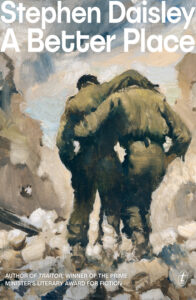
A Better Place (fiction)
Published by Text Publishing on July 4, 2023

Photo credit: Darren James
At the age of 53, Stephen Daisley sold his first novel Traitor to Text Publishing. He subsequently won the 2011 Prime Minister’s Literary Award for Fiction and UTS Glenda Adams Award. This same novel was shortlisted for the Commonwealth Writers for Best First Book, the Western Australia Premieres Literary Awards and NSW Christina Stead Prize for Fiction. Stephen’s second novel, Coming Rain, won the 2016 Ockham Award and was shortlisted for the Miles Franklin Award. Reviewer James Bradley (The Australian) wrote that ‘Daisley’s prose possesses a shimmering, allusive beauty reminiscent of John McGahern.’
Born in 1955 in Hastings, New Zealand, Stephen spent five years in the army before living in Bangkok, then worked in Australia and New Zealand as a sheep herder, bush cutter, truck driver, construction worker and bartender. After beginning his marriage and family life in New Zealand he eventually moved to Australia, attending Murdoch University and then the University of Western Australia for Post Graduate studies, supervised by Australian writer Gail Jones. During this time, Stephen underwent what he describes as his ’30 year literary apprenticeship’.
Stephen was the New Zealand writer in residence at Randell Cottage in 2017, during which time he worked on A Better Place, his third novel, about brothers at war. Beautifully written, brutal, tender and visceral, A Better Place is about love in its many forms. Published by Text in 2023, A Better Place was shortlisted for the 2024 Ockham New Zealand Book Award for Fiction.
Stephen lives in Western Australia with his wife and five children.
Text Publishing author page
NZ Listener post-Ockham Award interview (May, 2016)
NZ Herald article (May, 2016)
Radio New Zealand interview (June, 2015)

Published by Text Publishing on July 4, 2023
A Better Place (Text Publishing, 2023)
Coming Rain (Text Publishing, 2015)
Traitor (Text Publishing, 2010)
'The thirty-five of us were in the country of dream-merchants, and strange things were bound to happen.' - Anne Kennedy